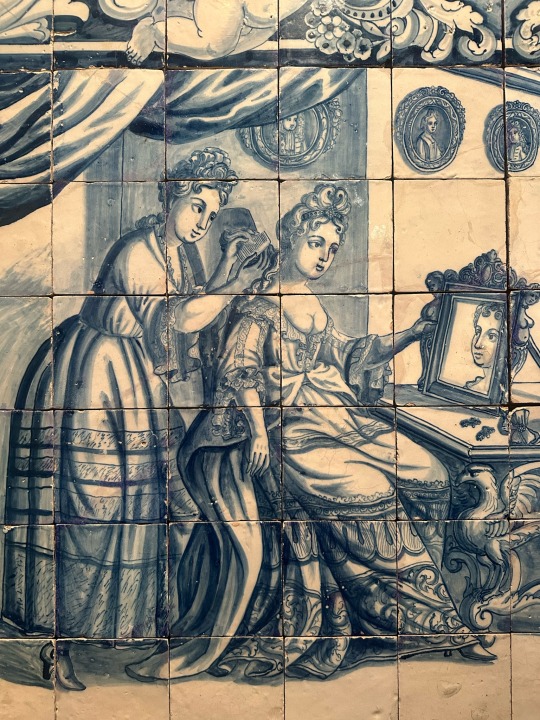Text
to be so honest things are falling apart and the center is lowkey not holding either
3K notes
·
View notes
Text
do you guys remember the first episode of star trek where everyone wore yellow turtlenecks and spock had a gun, just a huge fuck-off rifle
15K notes
·
View notes
Text
being a teenage girl between 2010 and 2015 must have been the shit. lana del rey dropped born to tie and ultraviolence. the arctic monkeys dropped am. justin bieber. one direction. u had tumblr and weheartit. u post a black and white pic of a cigarette and u get like 20k notes. pretty little liars, vampire diaries and glee were all on tv. twilight was still really popular. all around it must have been fun
23K notes
·
View notes
Text
comploro, -as, -avi, -atum, -are, I complain, Cic.
150 notes
·
View notes
Text
When I travel, it's usually to the country's capital but then sometimes I meet citizens of this country in different circumstances and they say they've never been there. I'm not judging because some capitals are far away and expensive but I'm wondering...
5K notes
·
View notes
Text
socal Media app perfec t size for put personal ID in to age veryify! inside very Safe and Web Security info kept safely put ID in Social Media Website. Put ID In Social Media Website. no problems ever in soccial media website because good third party App and Privacy for personal information sensitive of private state issued ID. Asocialmedia Website yes a place for a legal ID put ID in social media website can trust social media website for keepeing good secret of identity. friend social media
18K notes
·
View notes
Text
I get that sex and drugs are fun but even im like. at least have a 3rd thing. at least one more hobby. you can have a 3rd hobby. this isnt a purity thing this is a some of u are fucking boring thing.
58K notes
·
View notes
Text





my wife (time machine)
12K notes
·
View notes
Text
the appeal of ancient roman texts is that they make you feel complicit in something horrifying. lucan understood this
94 notes
·
View notes
Note
Hope you don't mind me asking (and feel free to ignore this if you don't feel like answering) but I've noticed there's a lot of debate on whether Helen left to go to Troy willingly or not, and whether Paris raped/forced her. I was wondering what the Iliad/Odyssey says on it (in terms of like word choices and stuff)? I really liked your breakdown of Calypso :)
hi anon! despite this ask remaining in my inbox for a MONTH i was NOT ignoring you. simply too busy to have energy for looking up iliad/odyssey passages, and i wanted to give this proper attention. i also want to start by taking a look at the immediate subsequent portrayals of Helen, to see if there's a contrast/how to approach Homer. although Homer is our earliest source, the oral tradition shows us that those epics did not develop in a vacuum, quite the opposite. (also sorry but i'm using topos text's horrific translation simply because i can ctrl+F a lot of passages very easily that way). also disclaimer: not my forte. People have built academic careers on the character of Helen and in comparison i have very surface knowledge.
whether Helen went willingly or not is a debate that was already RAGING in antiquity. the earliest textual evidence we have of that (afaik) is the archaic poet Stesichorus (c. 630 – 555 BC). Later ancient authors would allege that he wrote an abusive poem about Helen, promptly lost his eyesight, and regained it after writing the Palinode, praising Helen. The Hesiodic Catalogue of Women uses the terminology ἕλοιτο βίηι (seize by force), anticipating, in the myth concerning the suitors of Helen and their oath, that it was an abduction (though not actually passing judgement on the later event). the Catalogue, in relating Iphigeneia's myth, also describes the Trojan war as wreaking vengeance (ποινὴ[ν τεισόμενο) for the Argive Woman (a common misnomer/mythological variant for Sparta/Mycenae/Peloponnese). the next line also mentions an eidolon (εἴδω[λον)- this seems to refer to Helen, but may also refer to Iphigeneia, since she is saved from the altar by Artemis in the same line. Which woman is replaced by an eidolon is unclear (although my money is on Helen, since Iphigeneia is referred to after with an empathic αὐτὴν, leading me to believe that the poet is specifying that he's continuing the story that's about her. So, as close as we can get to Homer himself, the ambiguity and even discourse is already rampant.
sources that mention Trojan myth stuff but not Helen:
-homeric hymn to aphrodite
-hesiod's theogony
the Epic cyle is tricky, of course. we don't/barely have any fragments. I'm not super willing to tackle it based only on summaries from centuries later, especially because the use of Fate and Divine Influence change so much in the framing of events. even is Helen goes of her own accord, those two supernatural factors change the framing and focalisation- and the poets' own voice is exactly what we do not have. Actually, let's get that point out of the way via Gorgias, a classical sophist. in his speech Encomium of Helen, a rhetorical thought exorcise, he lists the causes of Helen's departure from Sparta thus:
by the gods,
by physical force,
by love, or
by speech (logos).
the fourth is a clever way to prop up his own profession. the other three are where the ambiguity arises, and demonstrates that the Greeks themselves were hyperaware of this issue. what is love but Aphrodite's power? how does physical force differ from Zeus' Grand Plan puppeteering around mortals? knowing these conundrums were discussed (even so much later), we may look for them in Homer.
the Homeric poet himself, very notably, does not make any comments about the incident (he's quite distant in general, making offhand comments here and there, bemoaning heroes and praising the Muses but rarely giving Opinions). his characters, especially Helen herself, absolutely comment upon the start of the war.
iliad
During the duel in book 3 between Menelaus and Paris, both heroes merely mention that Paris has Menelaus' wife and all her possessions. Neither specify whether that wife is there by choice.
The first to speak of blame/crime is Priam, to Helen (3.160ff):
Come hither, dear child, and sit before me, that thou mayest see thy former lord and thy kinsfolk and thy people—thou art nowise to blame in my eyes; it is the gods, methinks, that are to blame, who roused against me the tearful war of the Achaeans.
this entire book and this passage is a bit odd in that everyone acts like it's the first year of the war: a duel between the rivals for Helen, Priam needing Helen to point out who's who, Helen being amazed at not spotting her brothers. the Iliad in some ways tries to encompass the entire war in its narrative of the tenth year. When Priam says this, he refreshes the start and cause of the war. This passage may imply that Helen went of her own free will- at the time. but Priam's deflection should not be taken too lightly- we see that the gods influence mortals all the time in the Iliad, with deceptive dreams, rousing or calming feelings, powerups, or straight up demands. this passage very pointedly does not specify how Helen ended up in Troy- only that she's blamed for the war. In a world where you are your body and you are your possessions and you are your honour and reputation, we might as well blame her beauty, riches, and desirability. it's all the same.
Helen is depicted as extremely unhappy in Troy, at least by the tenth year of the war. She insults herself in conversation with other Trojans, bemoans the war, and comments on the abuse she's endured from the Trojan women. Helen answers Priam: (3.170ff)
Would that evil death had been my pleasure when I followed thy son hither, and left my bridal chamber and my kinfolk and my daughter, well-beloved, and the lovely companions of my girlhood.
She also calls herself κυνώπης (dog-eyed), which has a connotation of shamelessness, impulsivity, and lack of control (sexually or otherwise). famously, she calls herself a dog at 6.340 in conversation with Hector. Translators loved translating this directly to bitch with all its modern connotations, but a super good book called Shameless: The Canine and the Feminine in Ancient Greece explains perfectly how dogs in ancient greece had a connotation of 1) unsatiable hunger/greed/lust 2) impulsiveness and 3) inferiority to man but superiority to beasts- part of the oikos, but not worthy of a proper place at the table. omg all traits/roles that were ascribed to women! i love ancient misogyny meeting modern misogyny <3. but anyway Helen calling herself that may imply that she does see herself as having gone willingly/lustfully, complicating the issue further.
and (αἴσχεα δειδιότες καὶ ὀνείδεα πόλλ᾽ ἅ μοί ἐστιν) ('shame and the many revilings that are mine') at 3.242. but Shame is not necessarily personal in an honour-bound society- any misfortune not of your own doing that damages you or your reputation also shames you. Helen may simply find herself Shameful because she was unlucky enough to get kidnapped and viiolated by another man than her husband- such demeaning events shame her who before was an inviolable queen. This means that any statement about blame or shame is not conclusive about consent.
Does 'followed' imply willingness in ancient Greek? or simply accompaniment to the same place? Or, again, that ever-present complication, Aphrodite's influence?
Aphrodite's influence comes to the fore immediately after Paris escapes the duel with Menelaus in the same book. She goes to Aphrodite in disguise, is discovered because she's made her tits look just a little too good, and bosses Helen into doing her wifely duties: (3.395ff)
So spake [Aphrodite], and stirred Helen's heart in her breast; and when she marked the beauteous neck of the goddess, her lovely bosom, and her flashing eyes, then amazement seized her, and she spake, and addressed her, saying: “Strange goddess, why art thou minded to beguile me thus? Verily thou wilt lead me yet further on to one of the well-peopled cities of Phrygia or lovely Maeonia, if there too there be some one of mortal men who is dear to thee, seeing that now Menelaus hath conquered goodly Alexander, and is minded to lead hateful me to his home. It is for this cause that thou art now come hither with guileful thought. Go thou, and sit by his side, and depart from the way of the gods, neither let thy feet any more bear thee back to Olympus; but ever be thou troubled for him, and guard him, until he make thee his wife, or haply his slave. But thither will I not go—it were a shameful thing—to array that man's couch; all the women of Troy will blame me hereafter; and I have measureless griefs at heart.” Then stirred to wrath fair Aphrodite spake to her: “Provoke me not, rash woman, lest I wax wroth and desert thee, and hate thee, even as now I love thee wondrously; and lest I devise grievous hatred between both, Trojans alike and Danaans; then wouldst thou perish of an evil fate.” So spake she, and Helen, sprung from Zeus, was seized with fear; and she went, wrapping herself in her bright shining mantle
tl;dr go fuck him yourself Aphrodite - ah fuck here we go again. I think this is probably the most significant reference to Helen's journey to Troy- and I think that we can safely say that Helen, in the tenth year, frames her desertion as Aphrodite's deception (ἠπεροπεύειν) (note that this is not the same word as used of Calypso seducing/enchanting Odysseus). Aphrodite does not negate this- she simply strong arms Helen in doing it yet again. I specify that this speech occurs in the tenth year because we MUST incorporate the possibility that Helen's own view of her past actions has changed- we don't know if she immediately regretted her crime, if she was regretting it as it happened but had no choice, or if this regret is a result of the yearslong war and abuse she faces in Troy. it's ambiguous!! (she also tells Paris to go kill himself right after. queen.)
What we see happening here is either the results of many poets compiling many different takes on Helen in her own character speeches in one grand epic, making the character of Helen contradict herself, or the poet compiling the Iliad uniformly leaving this business open to interpretation and using vague af statements under the guise of divine intervention. Either theory works imo, and do not even necessarily contradict each other. Helen appears one final time to bemoan Hector, her staunchest defender against other Trojans, but apart from her unhappiness makes no further comment.
odyssey
Helen and Menelaus seem...happy back in Sparta? After a detour in Egypt (no eidolon business...allegedly) they've returned home and receive Telemachus together. Helen weeps for Odysseus' fate and drugs his son into happy thoughts (witch.). Helen herself acknowledges her own character development that i previously speculated about at 4.255ff:
Then the rest of the Trojan women shrieked loudly, but my heart rejoiced, since by now my heart had changed about going back home and I regretted my mad blindness, that Aphrodite gave me, when she led me there from my beloved fatherland, and I deserted my daughter, my bedroom, and my husband, who lacked nothing in either looks or wits.”
This statement is...very wooden. And yet, there it is. Aphrodite may have incited it, but is was done to her, a (demi-)mortal, and thus she is to blame. She deserted her place of honour. That was her fate, but her fate was brought about by her nature (beautiful. fickly? disloyal? easily blinded by lust?). We mustn't forget the context- by this time, Helen has been taken back by Menelaus after TWO Trojan husbands (she refers to Deiphobus only a few lines earlier) and like. what else could she have done. But the poet never gives a whiff of her being duplicitous at all, so it's up to us readers to make up our minds about this volte-face.
in book 14(.65ff), Eumaeus wishes the entire clan of Helen had died, since she made so many men perish at Troy. Neutral statement of cause and effect- he may blame her, but again, he could blame her just as well for being kidnapped. Shame is Shame.
Interesting statement from Penelope in book 23:
Not even Argive Helen, born of Zeus, would have mixed in love and lovemaking with a foreign man if she'd known the warlike sons of the Achaeans were going to bring her home again to her beloved fatherland. Yes indeed, a god incited her to do her shameful deed, but she hadn't stored that delusion in her heart before, the wretched delusion, from which sorrow first came to us, too.
Again, ambiguity ascribed to divine intervention- the deed is still hers and the blame to bear is thus also hers, but the reason is acknowledged. Even more interesting is that this statement comes from Helen's cousin, and in the tearful, loving speech she gives Odysseus after he's revealed the secret of the olive tree bed. tl;dr Penelope says 'I was only testing your knowledge of our deepest marital secret because my cousin (poor thing) was tricked by another mortal, be it at the incitement of a god'. Her argument may thus be disputed. the mention of Helen's foreknowledge is infinitely puzzling to me tbh- if she'd been allowed to stay with Paris, she would've done it even more so? She wouldn't have gone at all if she'd known she would just be dragged back? It makes very little sense of Helen's wishes and plans, especially in comparison to her scenes in Sparta.
so yeah, if you ask me, the Iliad and Odyssey portray an incredibly complex and ambiguous incident that is left open to interpretation (allowing for creativity and flexibility). The clearest red threads (imo) are that even if Aphrodite in some way bent the will of Helen, Helen is still blamed and blames herself for the resulting action- divine force does not absolve you from any consequences (hence all the epic statements about suffering being the lot of all mortals, because the gods are stronger than them- my fave is in the homeric hymn to demeter). secondly, Helen undergoes a character development- from lust to regret. At some point, it is implied, she did feel lust for Paris, but that lust is long gone by the time of the Iliad, and her previous lust is recognized for what it was- fleeting madness. But by then, it's already too late- she is trapped in Troy.
(LAST TANGENT but i love taking none of Helen's statements at face value (except perhaps the one to Aphrodite?)- my fave interpretation (though I don't claim validity) is that Helen as THE ONLY mortal daughter of Zeus is chasing immortality/heroic kleos in the only way a woman can-infamy. letting her suitors fight about her is not enough- now she needs them to fight for her. the face WOMAN that launched a thousand ships so no one would ever forget her name. she herself has created the ambiguity- let people forever debate if this famous beauty was pure as driven snow or duplicitous to the bone- as long as they talk about her power to ensnare men).
82 notes
·
View notes
Text






National Tile Museum in Lisbon. Would recommend.
6K notes
·
View notes
Text
being in academia is kind of like where you're on everest and you see the frozen bodies of the other people who've tried it strewn about everywhere and you think "okay, but that's them and i'm me"
6K notes
·
View notes
Text
Reblog and recommend the most interesting NONfiction book you’ve ever read in the tags.
#trauma by lucy bond and stef craps goes over the history of trauma as a concept which is really neat#also a huge fan of chris mccabe’s poems from the edge of extinction which is a poetry collection with essays on endangered languages
622 notes
·
View notes
Text
always thinking of that “i couldn’t stop wasting time” quote
41K notes
·
View notes
Text

Pearls Before Swine, 2025
shrink plastic, rubber stamps, colored pencils, freshwater & keshi pearls, brass, sterling silver
acknowledgements to Alexander Calder (for mobiles) and @elodieunderglass (for recent experiments using shrink plastic in jewelry)
496 notes
·
View notes


